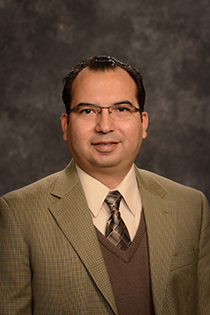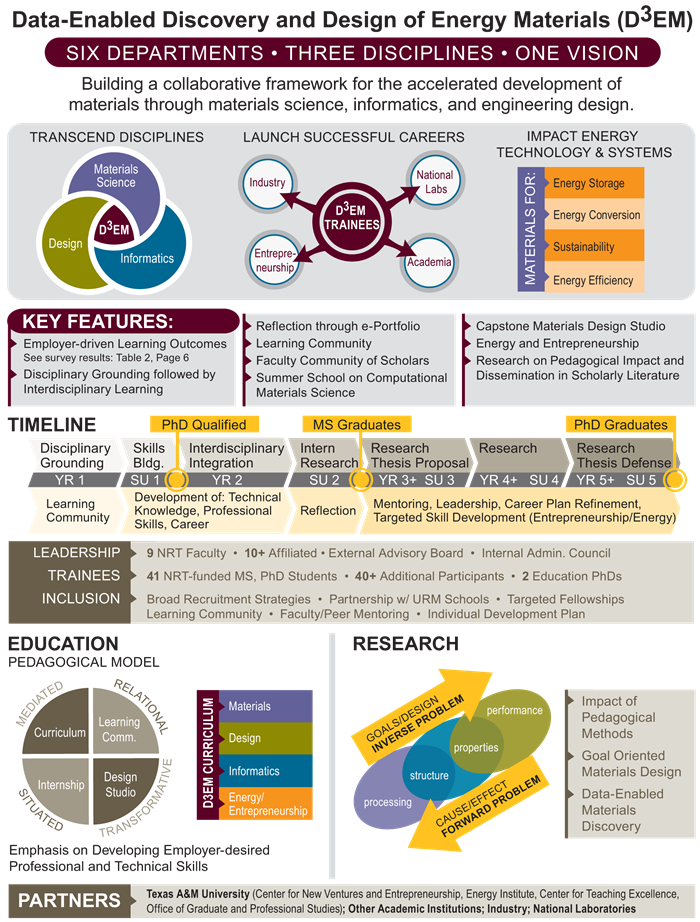Texas A&M University has received a five-year, $3 million grant from the National Science Foundation for graduate training and research. Texas A&M is one of only 10 institutions recognized nationwide with the award, out of approximately 200 proposals that were received by the NSF for the current funding cycle.
The NSF Research Traineeship (NRT) program titled “Data-Enabled Discovery and Design of Energy Materials (D3EM)” will provide approximately 40 NRT fellowships over a period of five years to graduate students from six different departments––materials science and engineering, mechanical engineering, chemical engineering, electrical engineering and computer science, as well as physics and chemistry––across the colleges of science and engineering. In addition to the NRT fellows, D3EM will support two Ph.D. students who will evaluate the pedagogical impact of the program.
 “This NRT program constitutes a valuable opportunity for the creation of a novel interdisciplinary graduate training program that places Texas A&M at the forefront of STEM graduate training” said Dr. Raymundo Arróyave, principal investigator and associate professor in the Department of Materials Science and Engineering.
“This NRT program constitutes a valuable opportunity for the creation of a novel interdisciplinary graduate training program that places Texas A&M at the forefront of STEM graduate training” said Dr. Raymundo Arróyave, principal investigator and associate professor in the Department of Materials Science and Engineering.
Co-investigators include Dr. Joseph H. Ross, professor, Department of Physics and Astronomy; Dr. Debra Fowler, associate director, Center for Teaching Excellence; Dr. Richard Malak, associate professor and Morris E. Foster Faculty Fellow I, Department of Mechanical Engineering; and Dr. Edward Dougherty, Robert M. Kennedy ’26 Chair Professor and Distinguished Professor, Department of Electrical and Computer Engineering.
Dr. Jodie Lutkenhaus, assistant professor and holder of the William and Ruth Neely Faculty Fellowship, Department of Chemical Engineering; Dr. Miladin Radovic, associate professor and associate department head, materials science and engineering; Dr. Hongcai (Joe) Zhou, Davidson Professor in Science, Department of Chemistry; and Dr. Douglas Allaire, assistant professor, mechanical engineering; are also members of the core team responsible for the design and deployment of D3EM.
Other D3EM affiliated faculty include Ibrahim Karaman, Department Head, materials science and engineering, Patrick Shamberger, assistant professor, materials science and engineering; Dimitris Lagoudas, senior associate dean for research; Alan Needleman, professor, materials science and engineering; Sarbajit Banerjee, professor, chemistry; Tahir Cagin, professor, materials science and engineering.
The D3EM team will join forces to develop the graduate curriculum with a pedagogical model developed in partnership with the Center for Teaching Excellence. The program will create a new training model to equip M.S and Ph.D. students with the skills to conduct interdisciplinary research in materials science, informatics and engineering design. Moreover, the interdisciplinary curriculum will also include energy and entrepreneurship-related courses and activities through partnerships with the Texas A&M Energy Institute and the Center for New Ventures and Entrepreneurship at the Mays Business School.
“There is a growing need to accelerate materials discovery and development, particularly in energy-related technologies. We need to instill in scientists and engineers the capability to transform data into knowledge, and use this to discover and design advanced materials. That way they can truly internalize the interdisciplinary research process. The D3EM program addresses all these needs,” said Arróyave. “More importantly, D3EM will help catalyze new collaborative research opportunities among participating faculty.”
Infographic credit: D3EM Program 